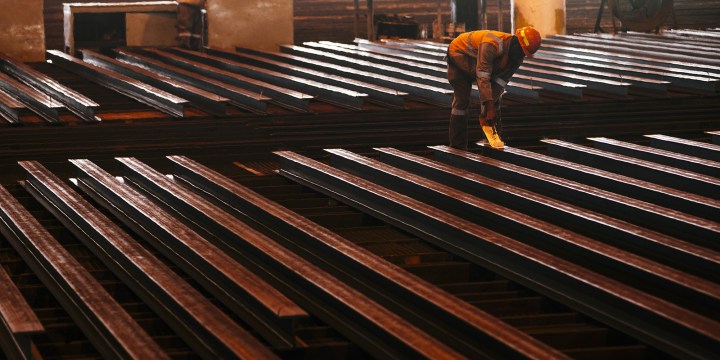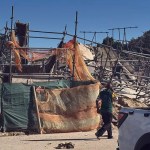BUSINESS MAVERICK
ArcelorMittal SA benefits from higher steel prices and a business reorganisation

A global shortage of steel due to a sharper than expected recovery in nearly all markets has pushed international steel prices back to their highest since 2008, helping ArcelorMittal SA narrow its losses.
China’s voracious demand for steel returned almost immediately after it emerged from lockdown in early 2020. But with other steel-producing countries still restricting factory activity because of Covid-19 the supply just wasn’t there.
It wasn’t just China; ArcelorMittal South Africa (AMSA) says the recovery was in nearly all international markets, including local demand from the construction and automotive sectors. Combined with nine-year-high iron ore prices and increasing prices for other raw materials, the deficit has pushed international steel prices back to levels last seen in 2008.
AMSA took advantage of the deficit, restarting its second blast furnace at Vanderbijlpark to support the supply of flat steel. It also decided to keep its electric arc furnace at Vereeniging in operation instead of mothballing it towards the end of 2020 as planned.
Even before prices recovered, the South African steelmaker was taking steps to address a business struggling to make a profit by cutting costs, reducing its workforce and reconfiguring its operating model. That included winding down its Saldanha Works as part of a larger review of its business to make sure significant historical losses didn’t reoccur in 2020. It will keep the plant under care and maintenance until it can find a sustainable solution to input costs.
What a difference six months makes. The company had a dreadful start to its financial year, with the hard lockdown resulting in wider losses across just about every metric. After deciding to idle the furnaces (that it’s now kept going) it said it would have to take more drastic steps than previously planned to ensure its sustainability.
At the halfway stage it reported negative earnings before interest, tax, depreciation, and amortisation (Ebitda) of R1.26-billion. Ebitda is used as a measure of operational performance. However, by the end of the year, it had managed to eke out an Ebitda profit of R37-million.
That was despite a 40% fall in revenue to R24.6-billion as sales almost halved – with the higher rand steel prices providing a cushion. While it had to contend with steeper electricity prices, it managed to lower other input costs as it diversified its sources of raw material, primarily iron ore, coking coal and scrap. It still reported a headline loss of just above R2-billion, albeit lower than 2019’s R3.27-billion loss.
In fairness, it did describe 2019 as the most challenging year for the world steel industry since the global financial crisis, with the correlation between steel prices and raw material costs breaking down.
While Covid-19 remains a risk to the business, AMSA expects sales volumes to continue improving and international steel prices to remain strong for now, supporting the improved performance as the new year gets under way.
The recovery in steel prices may be short-lived, though. Fitch Ratings expects prices to start declining as early as next month as global production continues to be restarted.
In a report last week, it estimated that 30% of global capacity outside China was idled or production at steel mills significantly reduced in response to a pandemic-induced drop in demand during 2020’s lockdowns and that current prices aren’t sustainable as mills restart to meet recovering demand from carmakers and the white goods industry. It also expects Chinese demand to be marginally lower in 2021 as infrastructure-focused stimulus measures are reduced.
“The steel industry remains subject to various risks that could affect demand, prices and margins, including those related to the pandemic, such as a wider virus spread, slow vaccination and new strict lockdowns,” said Fitch. “Input costs will continue to affect steelmakers’ profitability and cash flows.”
Despite a sharp pullback following the release of its results, AMSA’s shares have more than doubled in value this year. And they are well ahead of last July’s low of just 25c. It seems any good news is priced in for now and it may have to rely on its ongoing restructuring programme if Fitch proves to be right on prices. DM/BM




















You want to talk about AM and how they screw over the local steel industry in SA, talk to Gerhard Papenfus at NEASA.